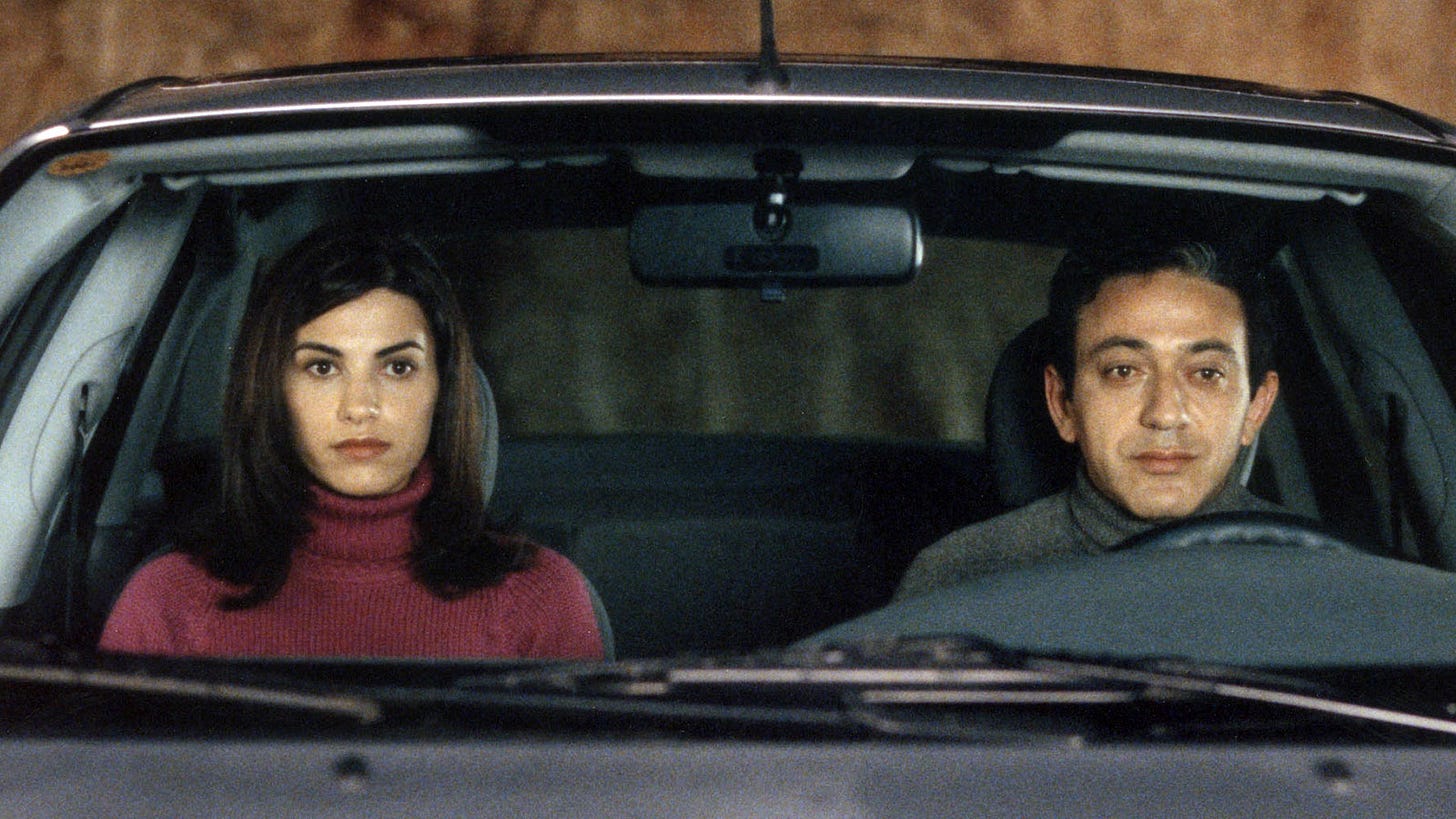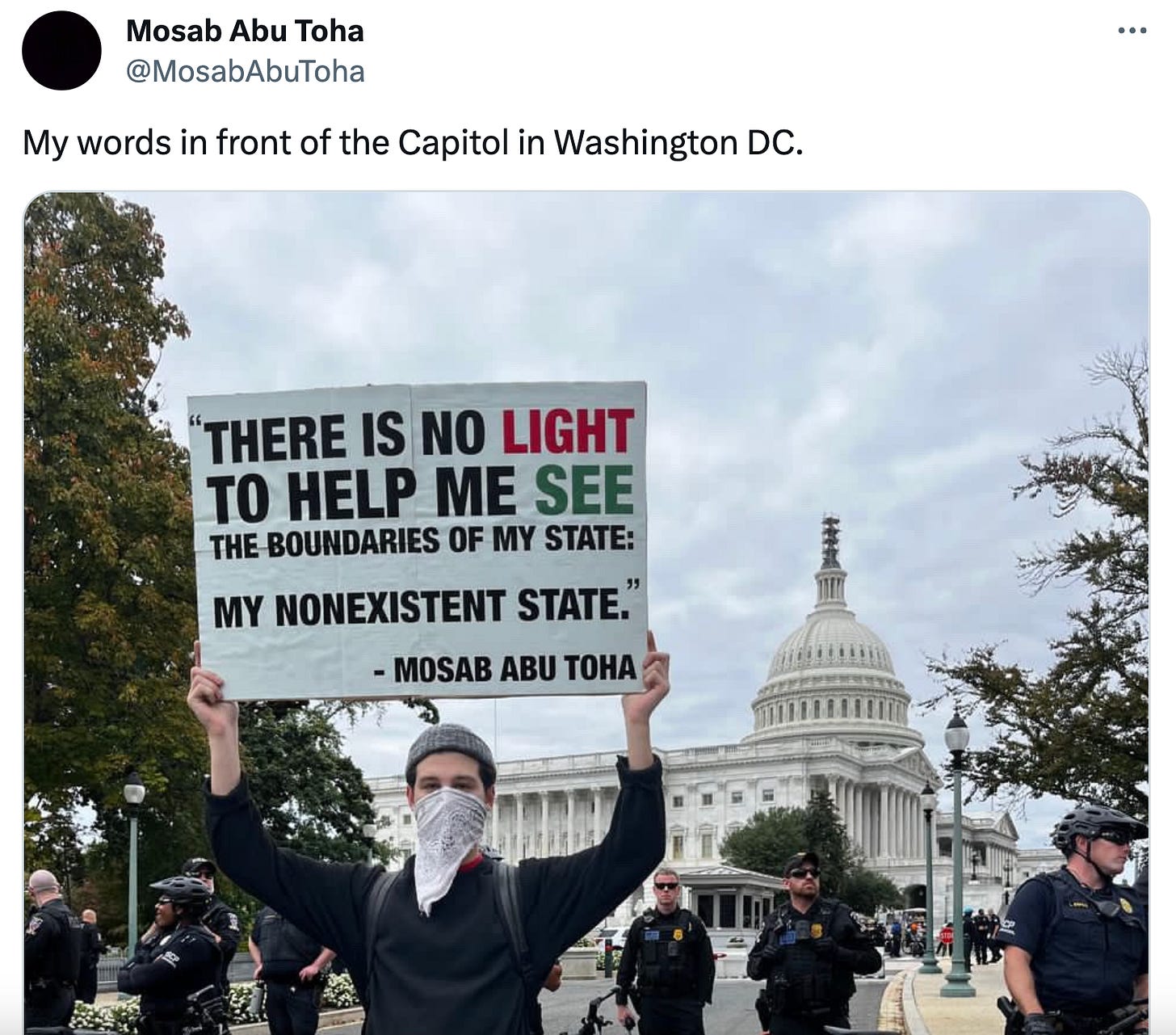"You Cannot Arrest the Poetry"
on Elia Suleiman's queer silence, the poets of Gaza, and the importance of art
Watching a genocide in real time through a window in your palm is a strange digital horror. Palestinians have asked us to bear witness, to share their stories, so it feels in a way that we must keep staring into this window, hearts gripped in the scroll. But people are much more than just death counts in the news, and in a world where politics, increasingly, have become based on our feelings, I’ve grown skeptical about the discursive power of more and more facts.
To change a mind through the heart, we need poetry. Lately I’ve been looking for ways to feel Palestine beyond the news feed and the history books, and I came across the films of Elia Suleiman.
In Divine Intervention,1 a Palestinian man meets a woman in a parking lot next to an Israeli checkpoint. She gets into his car and they look at each other, but say nothing. Instead, they hold hands, watching the soldiers harass, detain, and block drivers from the road. There is a long close-up on their hands as they caress and press together, undulating along to a sensuous score — a sex scene without sex. This pleasure occurs in full view of the military, while they stare down their own repression, while they say nothing.
Suleiman is famous for this kind of quiet, dark satire, and this is a film not so much about plot as it is about expressing what it feels like to live under occupation, to be an internally displaced “present-absentee” — those Palestinians who were pushed from their homes in 1948 but still reside in Israel. Some have referred to Suleiman’s films as silent, but he denies this.
“My silences are full of sounds, first of all,” he told Notebook in 2021:
NOTEBOOK: Considering your political approach, I’d like to ask about this apparent paradox, even though I wouldn’t call it as such. Usually, people don't associate silence with politics—rather, they are usually seen in this sort of inverse-proportional relationship, where the absence of speaking means taking the part of the oppressor or playing into all sorts of power dynamics. But you manage to elude this.
SULEIMAN: It's just the contrary. I think that structures of power fear silence because they don't want you to be reminded of your ephemerality. They want you to concentrate on what you can consume on a day to day basis, so their bank accounts can swell up from it. I think that when you start to think about time and this dimension of passing time, once you start to introduce a spiritual angle to your existence, they are scared and menaced. Because they would prefer you to go see an American Hollywood popcorn film and not think about the fact that you are wasting some precious moments of existence, that your moment is being consumed by a very surface-level pleasure, and not necessarily one that gets in touch with the deeper sense of existence. Power opposes that kind of silence. They prefer noise, action, illusions, distractions. Anything that has to do with spirituality and meditative moments is actually anti-authoritarian. They are de facto acts of resistance.”
Meditative is a good word for this film. Watching Divine Intervention was the most still and contemplative I have felt the since news media deluge on Gaza began, and it gave me a better sense of life under occupation that anything I’ve read. His use of silence creates space where his satirical, sometimes magical realist illustrations of life under a fascist government can be fully felt. Suleiman actually places himself inside his own movies — he is the silent man in the car, but he says plenty without using any words.
The scholar J. Logan Smilges might call this queer silence. Queer as in “the dissension occasioned by an inequitable power relation,” and silence “not only as an absence of speech” but also “an invitation” to think about other ways of communicating. This silence “is how we make ourselves heard when nobody is listening,” Smilges writes.
We are often told that silence is complicity, that marginalized people have a duty to make themselves loud, proud, and visible, but Smilges — who is autistic —explores how silence can be used to amplify other ways of speaking, like the image and the body. It can give us a way to notice the universal in the personal, and see how our struggles are connected across borders and identities.
In Suleiman’s most recent work, It Must Be Heaven, his character travels around the world trying to get funding for a film, casting his silence across structures of authority in countries that call themselves free. In America, he notices that everyone around him is carrying an assault rifle. In France, he watches the police whirl around on Segways and chase people in the streets. Suleiman has said that this film is his way of commenting on the “Palestinization” of the world:
“This character leaves all the time thinking he might identify a little bit with the new place to which he travels, but he finds his only identification to be with the globalized Palestine: violence everywhere, checkpoints, security apparatuses..”2
Maybe it seems trivial to talk about art in the face of mass death, but I don’t think it is. Toni Morrison wrote that making art is “how civilizations heal.” It’s how we know each other when speaking fails us; a means to escape, to resist, to remain even after we depart. Suleiman says:
“Of course, you can always put a poet in jail. But you cannot arrest the poetry.”
Mohammad Moussa, founder of the Gaza Poets Society, has written that life in Gaza has a way of making people into poets. “Writing is the only free medicine in this city,” a 22-year-old poet from the al-Nusairat refugee camp tells him. The poet Mosab Abu Toha is currently trapped in Gaza, but his words are free, and people are writing them on protest signs across the world.
“The police don’t like my poetry in Romania,” he posts next to a screenshot of protestors getting held up over one of his stanzas. In another, someone holds his poetry aloft in front of the White House.
Open Tabs
Toha’s book, Things You May Find Hidden In My Ear, is free to download right now from City Lights. Read I Grant You Refuge, in remembrance of Hiba Abu Nada. “As bombs fall, I write.” Artist Samia Halaby on a 2013 art exhibit in the bombed wreckage of a Gaza hospital. (See also: her work on the Liberation Art of Palestine.) “How do you find soul in destruction?” Ali al-Jabali painted murals on the wreckage. Nidaa Badwan locked herself in her room for over a year and made self-portraits. Raafat Hattab made a video of himself watering an olive tree. Malak Mattar picked up bright oils and painted her mother. For a digital archive of over 5000 liberation graphics: check out the Palestine Poster Project.
Suleiman’s films can be hard to find in the US, but this one and Chronicle of a Disappearance are on Netflix
There is a very literal reading here, too, considering that Israeli arms exports to other governments are developed in “the Palestine laboratory”






